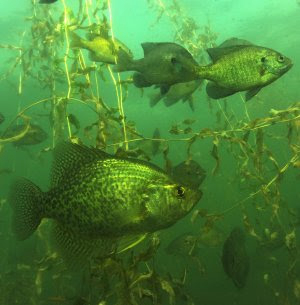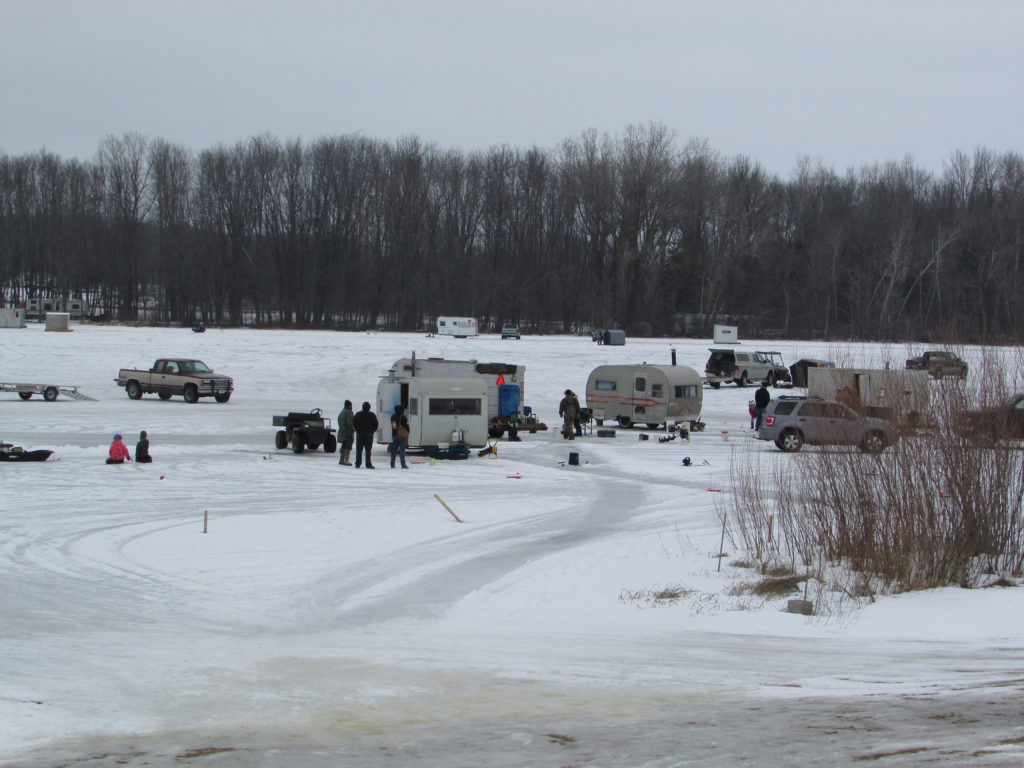Ice Fishing Tips from Northland Fishing Tackle
 The author often sight fishes for winter bluegills and crappies with his kids. Panfish are often curious about his underwater camera. Photo courtesy of Marcum Technologies
|
My winter fishing has changed in recent years. I used to spend hours staring at my flasher, waiting for “marks” to appear. I now prefer to actually see what’s going on below the ice, by direct eyesight or through the use of an underwater camera. Whether chasing panfish or larger predator species, sight fishing is a recipe for winter fun!
While I continue to use my Marcum flasher when employing a “search and destroy” approach, once I’ve located a hot travel route, I’ll get comfortable inside my portable house and set up for the show. I often have one of my kids fishing with me, as they all love sight fishing. I’ll auger three holes, two to fish through, and one for the camera, a Marcum VS 825SD. I’ll situate the holes in-line so the camera can view both lures.
Panfish Fun
Most often, my sight fishing takes place while targeting panfish. Sunfish and perch are generally active during midday hours, the best time for viewing underwater. These fish are not typically camera shy either. In fact, panfish species will even act curious about the camera. Crappies often become active late in the afternoon and can be caught on camera too.
A great location to set up camp for sunfish and crappies is along the outside edge of a deep weedline, as they often travel these edges. Sunnies and crappies eat small stuff, particularly in winter. Northland’s Bro Bug Jig tied to Bionic® Ice or Fluorosilk has been a fine combo for both species. I’ll add a real waxworm or an Impulse® Helium Waxyfly and jig aggressively until I see fish on the camera. Then, I’ll hold the jig still. At that point the fun begins! It’s a game if eye-hand coordination. Winter sunfish and crappies bite very light in many cases. I set the hook when I see the bait disappear. Even with the aid of a camera, I’ll often miss fish. Many will bite again. It can be quite a cat and mouse game!
For perch, I like to find a flat with active fish before setting up. A small jigging spoon adorned with part of a minnow or a couple waxies is the ticket. Spoons show up well on camera too. Again, I’ll jig aggressively until I see fish on the screen. Then, I’ll just make the spoon quiver. Perch will also pick at the bait but bite multiple times.
Predator Rush
For an adrenaline igniting experience, there’s nothing better on ice than sight fishing for larger predator fish. Pike and walleye can be caught in plain view or on camera.
I’ll target pike on shallow flats, in which case I can often forgo the camera and simply peer down the hole from within my portable shelter. I usually just fish one line also. If I think I’ve found a spot that warrants some time, I’ll cut double holes, two ten inch holes side by side, and then chisel the ice out between them. This gives me a better field of view. When fishing shallow water, it’s paramount to keep light from entering the shelter. I’ll bank the edges with snow and tightly close all doors and windows. This makes it easier to see into the water. Fish are less likely to spook as well. My favorite set-up for pike is Northland’s new Predator Rig baited with a dead smelt or live sucker. This “quick-strike” presentation is generally reserved for rigging below tip-ups. For sight-fishing however, I rig it on a medium-heavy action spinning rod, spooled with 10 or 15 pound Bionic® Braid. When using dead bait, I’ll occasionally jig the presentation just enough to get the Baitfish Image attractor blades to flutter and reflect light. Pike are weird. One day they will power in and strike viciously. The next day they’ll glide in every so-slowly, nose the bait, and swim away.
Of the different fish species I target on ice, walleyes are the most aggressive. When chasing winter walleyes in clear water, I like to set-up on predetermined hot-spots, discovered over the years. With the camera set up, I use vibrating lures to increase the strike zone and call fish from a distance. The Buck-Shot® Rattle Spoon has been my favorite for years. However, Northland’s new Rippin Shad, is getting a lot of play too. I’ve found that sitting tight on a precision spot and using vibrating baits, will at times, produce more walleyes than moving around. For me, sight fishing for walleyes and employing rattling lures compares to stand hunting and rattling for whitetails.
Through sight fishing, with and without the use of an underwater camera, I’ve learned more about fish behavior and had a lot of fun. Seeing is believing!
